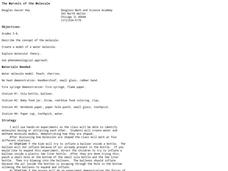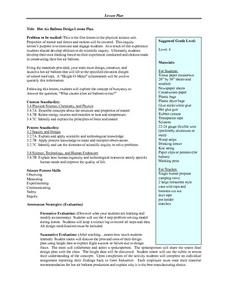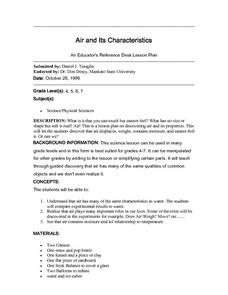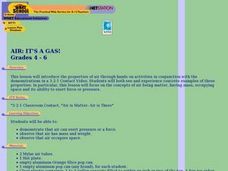Curated OER
Air Pressure
Learners participate in a series of demonstrations about Bernoulli's principle. They explain how air pressure varies with air speed. They write a detailed lab report about the activity. This is a great way to explore this concept.
Colorado State University
Why Can Warm Air "Hold" More Moisture than Cold Air?—Vapor Pressure Exercise
Does it feel a little humid in here? Learners assume the role of water vapor in the atmosphere as they explore the differences between warm and cold air. They roll dice to determine their level of energy, which determines if they stay...
Curated OER
How Do You Light Up Your World?
A tremendous presentation on the properties of light. Young scientists are treated to slides which share a lot of fascinating information about light. This impressive PowerPoint is filled with great photos, graphics, and discussion...
Curated OER
The Marvels of the Molecule
Students experiment with common substances to observe molecular behavior. In this molecular properties lesson, students move through four stations as they try to inflate a balloon inside a bottle, pour water from a jar, and observe how...
Curated OER
What's Air Got to Do with It?
Young scholars use M&M's to create a pie graph that expresses their understanding of the composition of air. They watch and conduct several simple experiments to develop an understanding of the properties of air (it has mass, it...
Curated OER
Hot Air Balloon Design Lesson Plan
Sixth graders discuss what they know and what they want to know about hot air balloon using a KWL chart. They then use a wide array of materials to design a hot air balloon that will lift successfully in cooperative groups referring to...
Curated OER
Air Is All Around Us!
Students design an instrument to show that air is all around. In this air lesson plan, students research, construct, and present a design that proves that air is all around, even though they can't see it or touch it. A teacher and self...
Curated OER
Properties of Matter
In this properties of matter worksheet, high schoolers answer 6 questions related to matter. They classify and categorize given statements as chemical or physical properties, they identify chemical and physical changes and they find the...
Curated OER
Properties of Air
Fourth graders participate in a demonstration lesson using bubbles in which they determine that air fills the bubbles. Next, they work in small groups as they they experiment with the properties of air at separate work stations. After...
Curated OER
Air and Its Characteristics
Young scholars explore air through guided discovery. In this air lesson, students will observe three demonstrations about air. They will answer leading questions as they observe how air displaces and takes up space, how air has weight,...
Santa Monica College
The Properties of Oxygen Gas
Scholars generate and collect pure oxygen through a decomposition reaction of hydrogen peroxide in the fourth lesson of an 11-part series. Then, they complete six investigations into the properties of oxygen.
Curated OER
Properties of Air
Students conduct investigations to demonstrate and learn that air takes up space, and puts pressure, or pushes, on everything around it. They conduct experiments to learn about feeling air pressure and measuring air pressure. Prior to...
Curated OER
Properties of Soil: Original Lesson Plan
This lesson is an investigation of soil properties, particularly texture, color and space for air and water. Student inspect soil samples found in their locale, perform several tests to determine different properties, and involves a ...
Curated OER
The Magic School Bus Goes on Air
Learners conduct an experiment to determine the properties of air based on a Magic School Bus adventure. They inflate and deflate zipper plastic bags to show that air takes up space and holds objects. They associate this with riding a...
Curated OER
Air is something
Students recognize that air has the properties of mass and volume. They predict, observe, and evaluate the effect of the air on various objects, using bubbles and bubble wands.
Curated OER
Air -- Is It Really There?
Students work together to perform simple experiments discovering the properties of air. They share their results with their classmates. They examine how engineers use the properties of air to clean the air of pollutants.
Curated OER
Air: It's a Gas!
Young scholars investigate the properties of air through hands-on activities in conjunction with the demonstrations in a 3-2-1 Contact Video.
Curated OER
Properties of Air Activity
In this properties of air worksheet, students experiment with a jar, a plastic bag and rubber bands to simulate that air takes up space and exerts pressure. They make observations and answer questions about their experiment.
Curated OER
Air Masses
Learners are given maps depicting two or more air masses and they then categorize bodies of air by temperature and moisture characteristics. They recognize large regions of similar type air. Students are given a map of air temperatures...
Curated OER
Air...What Gives?
Students investigate the properties of air by capturing it, squeezing it, and feeling its weight. In this forces lesson, students capture bags of air and examine its properties. The weight and pressure of air is emphasized.
Curated OER
Air Pollution: What's the solution?
In this air pollution worksheet, students compare pictures of effects caused by pollutants. There are 4 questions asked without answers provided.
Curated OER
Is Air a Fluid?
Students use baking soda, vinegar, matches, and other materials to pour gas. In this air lesson plan, students use the materials to pour gas and learn that air can be a fluid like a liquid.
Alabama Learning Exchange
Air is All Around You
Pupils investigate the mysteries of air. In this science lesson, students participate in hands-on activities that require them to use the scientific inquiry model to study air.
Alabama Learning Exchange
Float or Sink?
Experiment with mass and density as scholars figure out what makes things float or sink. First, they watch a podcast introducing these concepts. Be sure to use the comprehension question to test their understanding. Young scientists...
























